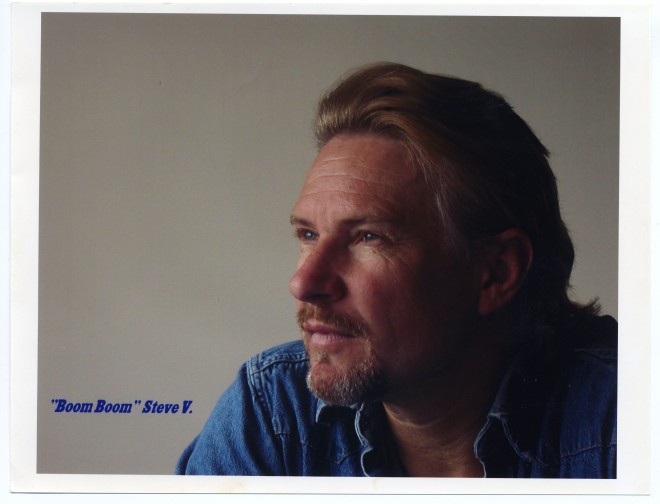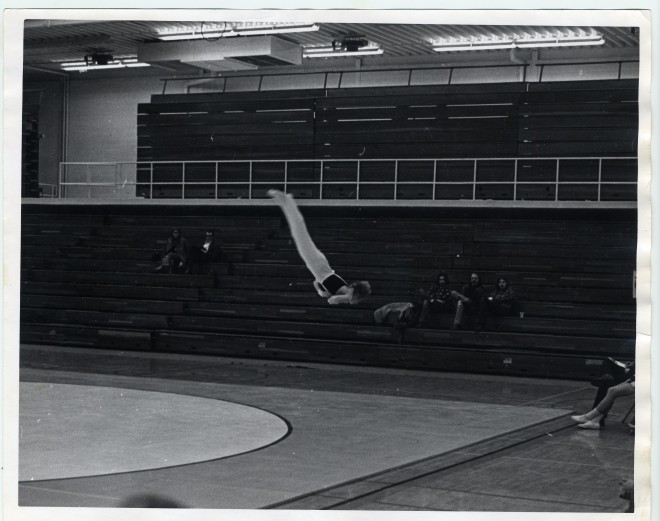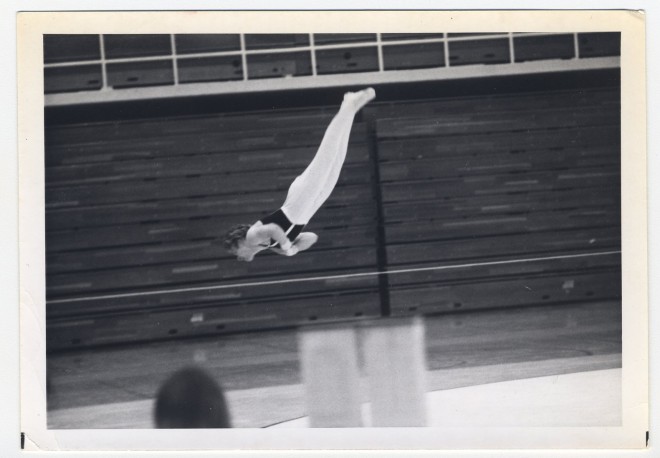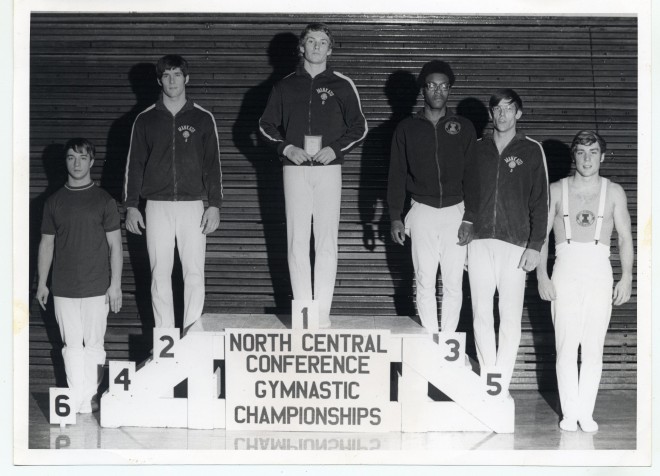 Steve Vonderharr is one of a kind.
Steve Vonderharr is one of a kind.
Vonderharr, who came to Minnesota State Mankato as a gymnast in the 1970s and later served as the head coach of the men’s gymnastic team, also developed an enduring interest in the blues while in Mankato. Now, he may be the lone example of a blues musician with a background in collegiate gymnastics.
“There’s not any others that I can think of,” Vonderharr says. “There was a drummer on the gymnastics team, and we were in a band together. But as far as singers go, I think I might be the only one.”
Vonderharr’s flourishing career as a Twin Cities-based blues singer and harmonica wizard began during the six formative years he spent as a student and adjunct professor at then-Mankato State from 1972 to 1978.
“It was like I was living two lives at that time,” he says. “Being an athlete under scholarship, I had to be at practice five days a week. But my exposure to live music at night had really jazzed me up and made me interested in music in general and in performing it, even. That was still a long ways out, but I was interested.”
Similarly, his interest in gymnastics evolved over time. The son of a traveling salesman, Vonderharr was raised in Billings, Mont., and various locales in Utah before moving to Burnsville, Minn., in 1969 as a high school sophomore. That was the year he decided to take up gymnastics.
“I just liked the idea of flying through the air,” Vonderharr says with a laugh. “Back in that day, trampoline was an event; now they took it out because it’s so dangerous.”
During his senior year in high school, Vonderharr briefly considered attending the University of Minnesota or Winona State, but he doubted that college was in his plans. Despite reaching the state gymnastics tournament in two events, he thought his athletic ambitions were ending. But then Vonderharr was summoned to the school’s administration office, and the course of his future was altered.
“I thought, ‘Oh no, what kind of trouble am I in?’ ” he says. “But it was the Minnesota State Mankato gymnastics coach (Bill Holmes) who wanted to talk to me. We started talking, and I went down for a visit. We toured the campus and he made me a [small scholarship] offer. So that made all the difference for me.”
 In the fall of 1972, Vonderharr moved into McElroy. It didn’t take long for him to realize that he was in the right place—athletically, academically and socially. A blues and rock and roll fan since high school, Vonderharr’s immersion into Mankato’s thriving live music scene was a watershed moment. “When I went down to Mankato, I was like, ‘Wow! Live performing!’ It was like a renaissance period for local music, and we didn’t even know it at the time.”
In the fall of 1972, Vonderharr moved into McElroy. It didn’t take long for him to realize that he was in the right place—athletically, academically and socially. A blues and rock and roll fan since high school, Vonderharr’s immersion into Mankato’s thriving live music scene was a watershed moment. “When I went down to Mankato, I was like, ‘Wow! Live performing!’ It was like a renaissance period for local music, and we didn’t even know it at the time.”
Gymnastics occupied most of Vonderharr’s undergraduate years; he won two conference titles in floor exercise and another in vaulting. He also had a job making breakfast at Gage, which required him to climb up Stadium Road most mornings. “I’d go up that hill by Gage every day at 5:30, 6:00 a.m.,” he says. “Man, it was a good workout, but in the winter, you can imagine.”
After earning his undergraduate degree in psychology in 1976, Vonderharr stayed in Mankato to obtain his master’s degree. He was also named the gymnastics head coach and taught gymnastics classes to Physical Education majors.
 “The whole tone of going to college changed for me then,” he says. “I went from a wild college senior to an adjunct professor and a coach. Graduate school was so much different in the sense that I was in with a lot of adults who were very serious, and now I was competing with them for grades.”
“The whole tone of going to college changed for me then,” he says. “I went from a wild college senior to an adjunct professor and a coach. Graduate school was so much different in the sense that I was in with a lot of adults who were very serious, and now I was competing with them for grades.”
Before completing his master’s degree in Counseling in 1980, Vonderharr explored teaching and coaching opportunities in the gymnastics hotbed of Houston, Texas. Not unlike his years in Mankato, a robust live music scene awaited him there.
“Music-wise, Houston was like a blow to the head,” he says. “And I was able to work on my thesis and send it back and forth to Mankato. Finally, they said, ‘You got it, you’re done.’ So I came back up to Mankato, graduated and started looking for a job.”
Vonderharr relocated to the Twin Cities and found steady employment in child and adult protective services. By the late 1980s, he was confident enough in his burgeoning harmonica skills that he decided to pursue his longtime goal of live performing.
He was hired as a sideman in various Twin Cities blues and rock combos. Music became not only a fun night out, but a cathartic refuge from the often grim realities that Vonderharr faced investigating child abuse.
“Playing blues was a great way to deal with stress,” says Vonderharr, who is a supervisor of the Adolescent Services Unit at the Minnesota Department of Human Services. “It still is, but it really was a way to get away from the heavy aspect of my day job at that time, no doubt about it.”
His gymnastics experience has served him well in his music as well. Even today, at 59, Vonderharr’s dexterity and infectious energy rarely betray him or his audience. His business card crystallizes his musical philosophy succinctly: “Good time blues for all occasions.”
“There really is a crossover between gymnastics and music,” he says. “Everyone’s looking at you and wants to see what you got. There’s a saying in gymnastics: ‘Go for it, take a risk.’ And I carried that mentality into musical performance. It’s a show, and you’re right to want to impress people and help them enjoy themselves. That’s what you’re there for.”
Vonderharr now fronts his own band, Boom Boom Steve V & the Knockouts, and formed a duo in 2011 with guitarist Kit Kildahl, a veteran of a Mankato band from the 1970s that a young Vonderharr once sought out and recorded.
“Steve hits the blues scene very hard,” Kildahl says. “Everyone knows him; he’s a real networking guy. Very charismatic. And as a harmonica player, he is one of the best around, anywhere. He can play all (harmonica) positions with assuredness.”
After being named “Best Blues Duo” by the Minnesota Blues Society, Vonderharr and Kildahl competed in the International Blues Challenge in Memphis, Tenn., in January 2013. Though they didn’t advance in the tournament, Vonderharr and his partner played it their way. There was no compromising—perhaps to their detriment, he concedes.
“The thing we did wrong was play all originals,” says Vonderharr, adding that it didn’t help their chances when the event emcee couldn’t properly pronounce his name. “That probably hurt us. If we were being smarter strategically, we probably would’ve played more songs that people would recognize. But the biggest thing was that it opened my eyes that we can play with anybody.”
More than 40 years since he first stepped on the Minnesota State Mankato campus, Vonderharr returns periodically to Mankato, playing the blues mere blocks from the music venues he frequented as a wide-eyed undergrad.
“I have tons of great memories from Minnesota State Mankato,” he says. “People I knew, places I went. I still like to take a nostalgic walk around campus, and I’m always surprised by how much things have changed, but remain the same.”
Speak Your Mind